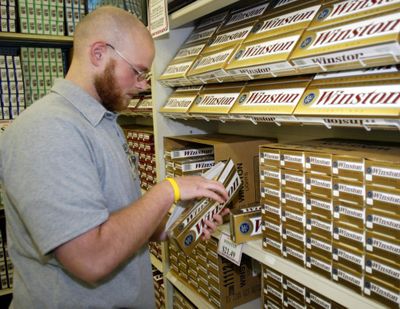New website raises awareness of cigarette trafficking

RICHMOND, Va. – Reynolds American Inc. is inviting lawmakers, law enforcement officials and others to take a trip along “the New Tobacco Road,” where organized criminals are garnering huge profits for smuggling cigarettes and selling them on the black market with a quick drive along the East Coast’s major interstate.
The owner of the nation’s second-biggest tobacco company launched a website Thursday aimed at raising awareness of cigarette trafficking, which is estimated to cost states $5.5 billion annually in lost tax revenue. Reynolds said it hopes the site with studies and news reports will help illustrate that cigarette smuggling isn’t a victimless crime and provide governments with information about stiffening penalties and increasing enforcement.
Most of the smuggling is taking place along Interstate 95, which the maker of Camel and Pall Mall cigarettes has dubbed “the new Tobacco Road.” Low excise taxes have made states like Virginia and North Carolina – home to the nation’s top cigarette makers, including R.J. Reynolds Tobacco Co. – an attractive base for smugglers because trafficking enough cigarettes can lead to enormous paydays.
Virginia is home to cigarette giant Philip Morris USA and the nation’s most prolific cigarette factory – as well as the country’s second-lowest cigarette tax at $3 a carton. That means smugglers can easily buy hundreds or even thousands of cartons and resell them on the streets and at mom-and-pop shops in the Northeast, undercutting retailers and skirting the higher taxes imposed there to boost public revenues and curb smoking rates. New York City, for example, taxes cartons at $58.50 apiece – nearly $6 a pack. Just a short drive away in Washington, D.C., the tax is $25 a carton.
The federal Bureau of Alcohol, Tobacco, Firearms and Explosives estimates a carton can yield up to $85 in profits. A case with 60 cartons brings in up to $5,100 in profits and a single truckload, which is typically 800 cases, generates a profit of up to $4.08 million. In most cases, those caught will face minimal penalties for smuggling cigarettes, whereas trafficking narcotics would land those caught behind bars for years.
“(Cigarettes) are the new currency for organized crime,” said Rich Marianos, a 27-year ATF veteran who retired earlier this year and is now working on cigarette smuggling issues with the industry. He’ll blog about the issue on Reynolds’ new website. “Whether street gangs, whether it’s outlaw motorcycle gangs, whether it’s terrorist organizations, whether it’s ethnic organized crime, everybody seems to be touching into this arena.”
Reynolds spokesman Bryan Hatchell said black market cigarettes hurt retailers’ ability to sell their products and make it difficult to ensure cigarettes aren’t getting into the hands of minors. Also, when states lose tax revenue, they might try to recoup the money by raising cigarette taxes, Hatchell said.
Several states have passed legislation aimed at tackling cigarette smuggling in recent years and others have stepped up enforcement efforts. But plenty rely on the ATF, which has prosecuted several high-profile smuggling cases in recent years. In one notable case in 2002, a federal jury in North Carolina convicted two Lebanese citizens of diverting millions of dollars in cigarette smuggling proceeds to the radical Islamic group Hezbollah.
“There’s nothing that’s out of bounds with these guys. There’s not a line that they wouldn’t cross all the way from the trading of marijuana to murder,” Marianos said. “How many more times do we have to bang on the windows before people are going to pay attention?”